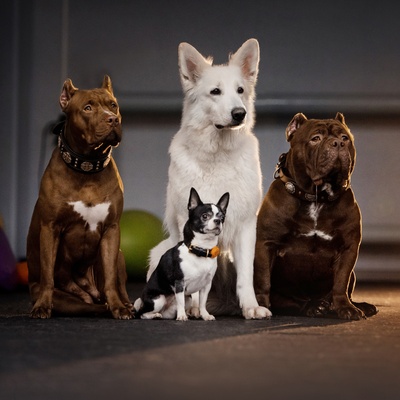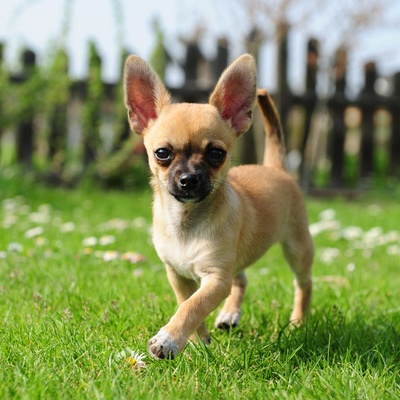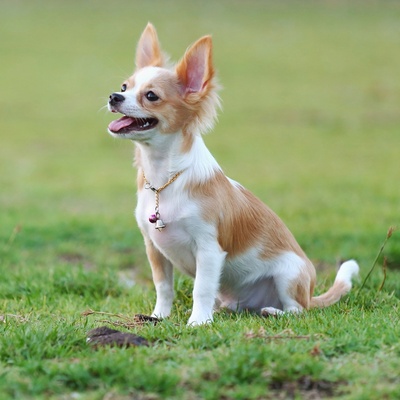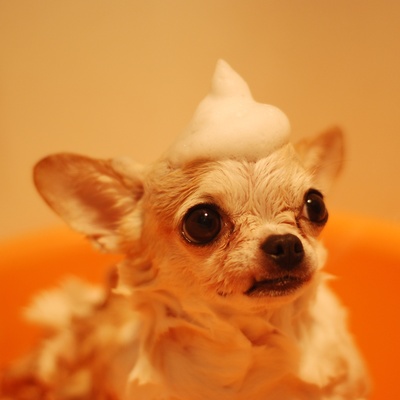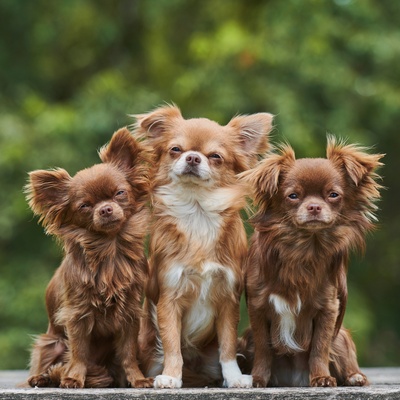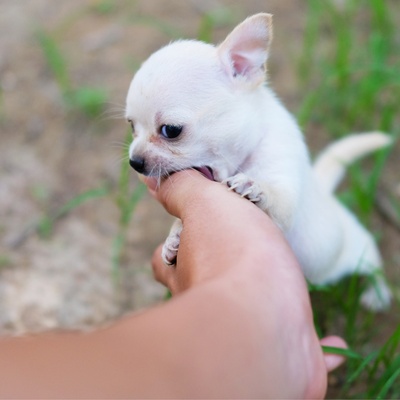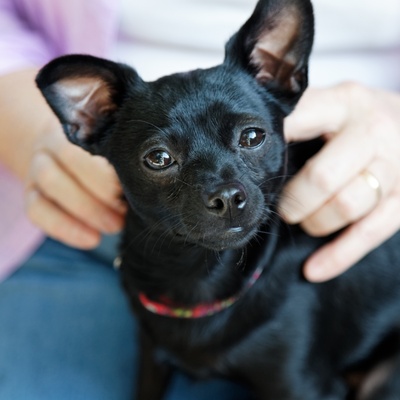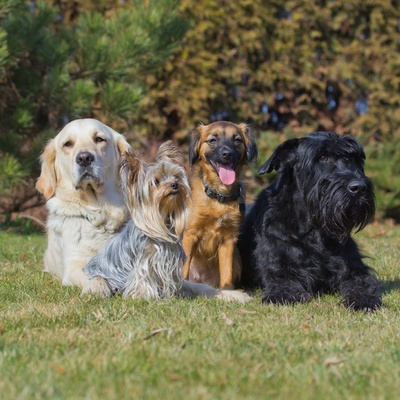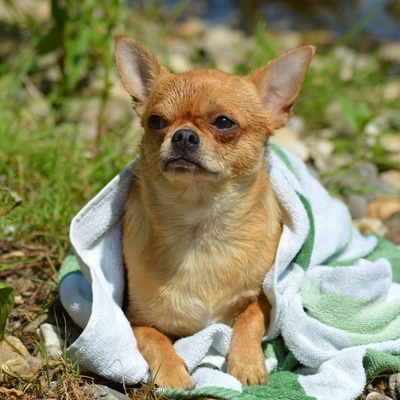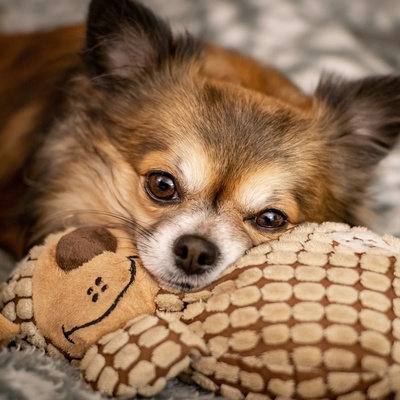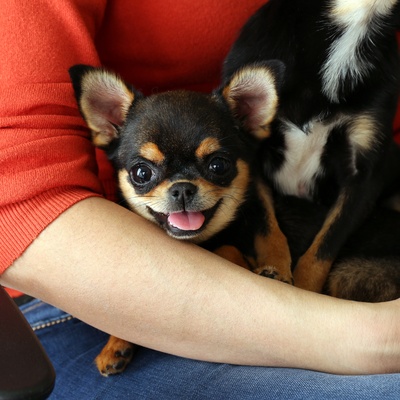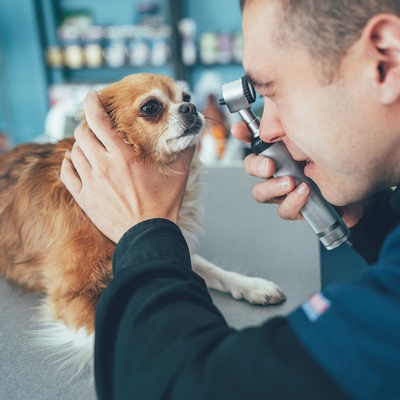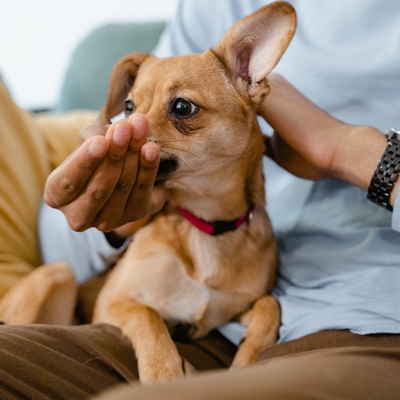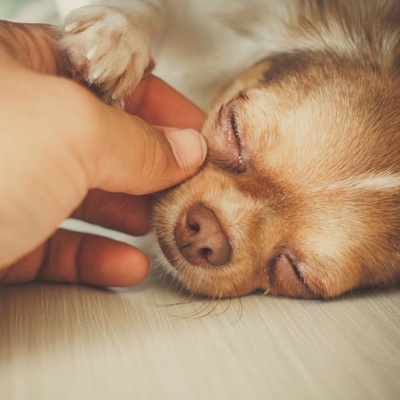Introducing the Chihuahua
Discover all there is to know about the Chihuahua : its characteristics, behavior, training, and its cost.
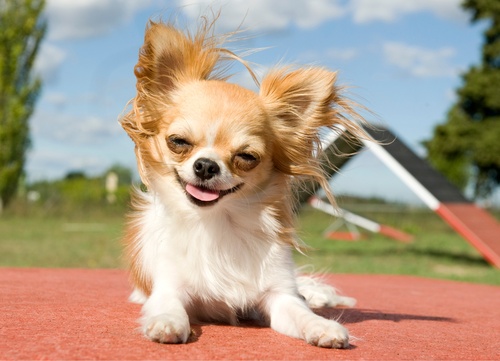
Discover all there is to know about the Chihuahua : its characteristics, behavior, training, and its cost.
The Chihuahua, the tiniest breed, stands out for its massive popularity worldwide. Despite their small stature, Chihuahuas command attention, boasting a bravery and personality much larger than their physical size. They are adept in various roles, from loyal companions and active participants in canine sports to comforting emotional support animals. Their loyalty and affection towards their owners are profound, creating an intense bond that is both heartwarming and protective.
They may be small, but their courage and protective instincts are mighty, ensuring they are always ready to stand by their loved ones. Chihuahuas adapt well to different living situations, from cozy apartments to lively homes, proving that great things indeed come in small packages. Their spirited nature and big hearts make them not just pets, but beloved members of any family.
This section outlines the unique features of the Chihuahua breed.
The Chihuahua belongs to the Toy group (9), which includes small breeds designed primarily for companionship.
Chihuahuas are the smallest dog breed, typically weighing up to 6 pounds and standing 5-8 inches tall at the shoulder.
Chihuahuas come in two coat varieties: smooth and long. The smooth coat is soft and close to the body, while the long coat is fine and can be either slightly curly or straight.
Chihuahua coats can vary widely in color, from solid black, white, and chocolate to tricolor (chocolate, black, and white), and even merle.
Chihuahuas adapt well to almost any environment, thriving in both apartments and houses. They prefer warmer climates but can live comfortably anywhere with appropriate care.
Chihuahuas are friendly and sociable with their families but can be reserved around strangers. They can get along with other pets, especially if raised together.
Chihuahuas are generally healthy but can be predisposed to certain conditions. Regular veterinary check-ups are essential for their well-being.
Chihuahuas are intelligent and eager to please, making them relatively easy to train. They respond well to gentle, consistent training methods and enjoy learning new tricks and commands.
We can help!
Every dog has its own character, and so do you. Making the right choice will ensure his well-being and yours.
Take our quiz to find out which breed is right for you, based on your personality, lifestyle, location and many other criteria.
Don't wait any longer and take the quiz to find out the answer!
Chihuahuas are tiny, yet boast an elegant and well-proportioned appearance. With their distinct smooth or long coats ranging from solid colors to unique patterns like merle, and their expressive faces featuring bright, round eyes, they capture hearts effortlessly.
Chihuahuas are among the smallest dog breeds. Females and males typically stand at 5-8 inches tall. When it comes to weight, both female and male Chihuahuas fall into a petite range of about 2 to 6 pounds.
Despite their small size, Chihuahuas grow relatively quickly, reaching close to their adult weight by around 6 months of age. However, their physical and personality development continues, with them maturing fully by the age of 1 year.
Chihuahuas come in two distinct coat types: smooth and long. The smooth coat variety has soft, glossy fur lying close to the body, while the long coat variety boasts soft, fine guard hairs that may be straight or slightly curly, with fringes on the ears and tail for that extra flair.
The Chihuahua's coat offers a broad palette, from solid colors like black, white, and chocolate to varied patterns including merle, brindle, and tricolor. This diversity in coat color underscores the breed's appeal and individuality.
Despite the differences in coat type, Chihuahuas are relatively low maintenance in terms of grooming. The smooth coat variety requires occasional brushing to remove loose hairs, while the long coat variety benefits from regular brushing to prevent tangles and mats, especially around the fringes. Chihuahuas do shed, but their small size means there's less fur to deal with compared to larger breeds.
Chihuahuas are not heavy shedders, and regular grooming can help manage shedding effectively. While they don't need frequent baths, keeping a Chihuahua clean and brushed is essential for their health and comfort, with bathing recommended only as needed to avoid drying out their sensitive skin.
The Chihuahua is a marvel of balance and proportion in a miniature package. Despite their small stature, they exhibit a well-proportioned body with a distinctive apple-shaped head, a hallmark of the breed. Their expressive eyes are large, round, and typically dark in color, adding to their alert and lively expression. The ears are large, erect, and set wide apart on the head, emphasizing their keen sense of hearing and giving them a characteristic perky appearance.
The body of the Chihuahua, though petite, is compact and slightly longer than tall, showcasing a robustness that belies their diminutive size. Their musculature is lean, allowing for sprightly movement and agility. This combination of features - the prominent head, luminous eyes, large ears, and a well-structured body - contributes to the Chihuahua's unique and captivating charm.
Chihuahuas are known for their loyalty, alertness, and affectionate nature, making them charming companions that are protective of their owners.
There are over 340 recognized dog breeds divided into various groups based on their characteristics and roles. The Chihuahua falls into the Toy group (9), which encompasses breeds that are primarily kept for companionship. This group includes breeds such as the Pomeranian, Yorkshire Terrier, and Pekingese. They are valued for their alertness, intelligence, and affectionate demeanor.
Chihuahuas, in particular, stand out within the Toy group for their vivacious personality, remarkable intelligence, and their instinctively protective nature despite their small size. Their primary role is that of a companion dog, offering unwavering loyalty and affection to their owners.
Chihuahuas are lively and confident, often displaying a larger-than-life personality. They form incredibly close bonds with their owners, showcasing a level of affection and loyalty that is profound. These tiny companions are known for their devotion, often preferring the company of their human over others.
A present and attentive owner is crucial for the Chihuahua’s emotional well-being, as they thrive on interaction and approval. Despite their size, Chihuahuas can be fiercely protective, sometimes to the point of being overly territorial.
Chihuahuas possess a sociable streak, especially when their socialization starts early. They can be generous with their affection, particularly towards members of their own family. While they may be cautious or reserved around strangers, they warm up quickly once they feel secure.
Chihuahuas can coexist peacefully with children who understand how to interact gently with small pets. Their compatibility with other animals varies; they get along best with pets they’ve been raised with. Early socialization is key to developing a well-rounded, friendly Chihuahua who navigates new experiences with confidence.
Take the test and find out the dog breed that matches your personality and lifestyle.
Chihuahuas are exceptionally adaptable and can happily live in various settings, from small apartments to spacious houses, whether in bustling urban areas or tranquil rural locales. What matters most to these petite companions is the presence and attention of their owners. For their physical and mental well-being, Chihuahuas require daily walks, though due to their small size, shorter durations of about 15 to 20 minutes can suffice.
Despite their diminutive stature, Chihuahuas possess an adventurous spirit and benefit from having access to outdoor spaces where they can explore and play. While not requiring vast expanses, a secure, enclosed area where they can safely satisfy their curiosity and expend energy is ideal. This can include a safely fenced yard or regular visits to a dog park. Their size makes them well-suited to indoor play as well, but outdoor adventures can significantly contribute to their overall happiness and physical fitness.
The Chihuahua, despite its small size, boasts an impressive intelligence and eagerness to learn. Training these little dogs requires patience and understanding due to their spirited nature. They respond well to positive reinforcement techniques such as treats and praise, making training sessions both fun and rewarding.
However, their independent streak may sometimes challenge training consistency. To ensure their safety, especially when outdoors, equipping a Chihuahua with a GPS collar can be a wise precaution to prevent them from getting lost or escaping during outdoor adventures.
Chihuahuas possess commendable listening skills, making them capable students in the training arena. Their intelligence allows them to pick up commands quickly, but their assertive nature means they do best with clear, consistent instructions. Training should start early to harness their attentiveness and to mitigate any potential stubbornness.
It's crucial to establish a firm yet gentle leadership to guide them effectively. While they are inherently sociable, Chihuahuas benefit from socialization training to polish their interactions with other pets and people, enhancing their well-roundedness as companions.
The Chihuahua is generally considered a healthy breed with a long lifespan. However, like all dog breeds, they require daily care and preventive measures to maintain their health and avoid common diseases and infections.
Chihuahuas are known for their overall good health and robustness, but they do have predispositions to certain conditions. Common health issues include dental problems due to their small mouths, patellar luxation, heart issues, and hypoglycemia, especially in smaller or younger Chihuahuas.
Symptoms to watch for can range from limping (for luxation) to lethargy (for hypoglycemia). With proper care, Chihuahuas can enjoy a lifespan of 14-16 years, making them one of the longer-lived dog breeds.
Regular veterinary check-ups are crucial for keeping a Chihuahua healthy, including up-to-date vaccinations, deworming, and flea and tick treatments. Daily care should focus on brushing their coat, cleaning their ears to prevent infections, dental care to prevent tooth decay and gum disease, and trimming their nails to avoid overgrowth and discomfort. Being attentive to a Chihuahua's potential allergies is important, and consulting a veterinarian for specific dietary or environmental changes may be necessary.
While Chihuahuas are not classified as hypoallergenic, their small size and grooming needs can make them suitable for many homes looking to minimize pet dander. Taking these steps will ensure your Chihuahua remains a happy and healthy companion for many years.
Every dog breed has its unique set of nutritional needs, and the Chihuahua is no exception. Chihuahuas require a diet rich in proteins and vitamins to support their fast metabolism and to keep their muscles and bones strong. Premium kibble designed for small breeds is recommended because it offers a well-rounded blend of essential nutrients tailored to their specific requirements.
For Chihuahuas with higher activity levels or additional protein needs, supplementing their diet with lean meats such as chicken or beef can be beneficial, provided that fat intake is kept to a minimum.
It's important to monitor their food intake closely, as Chihuahuas can easily become overweight if overfed or if fed a diet too high in calories. Regular, measured feedings will help ensure they receive the nutrition they need without the excess that can lead to health issues.
The Chihuahua is highly regarded for its personality and size, making it a popular choice among dog lovers. There are many breeders specializing in Chihuahuas, but it's important to consider several factors before adopting.
Before adopting a Chihuahua, it's crucial to make an informed decision. Look for a reputable breeder by visiting their premises to observe the living conditions and behavior of the dogs. Assessing the health of the puppy and its parents is essential. A responsible breeder will be transparent about the puppy's health status and any hereditary conditions.
Lastly, you must have your dog microchipped by the age of 8 weeks old and have their details registered on a relevant database like Petlog or Animal Tracker. This is a legal requirement in Great Britain, and failure to comply could result in a £500 fine. Your vet can microchip your dog for a small fee, or any Blue Cross center will do it for free.
The cost of acquiring a Chihuahua can vary significantly depending on factors such as the dog's lineage, pedigree, the breeder's reputation, and the age of the dog. On average, Chihuahua puppies can range from £500 to £1500 from a reputable breeder.
In addition to the purchase price, potential owners should consider the ongoing costs of maintaining a Chihuahua, including veterinary fees, food, and other essentials. The annual expense for caring for a Chihuahua can be estimated at £700 to £1000, depending on healthcare, grooming needs, and lifestyle.
Choosing a dog that matches your personality and lifestyle will ensure your well-being and his!
To access the most relevant information, suitable payment methods, and delivery in your region, please select the website corresponding to your country.

